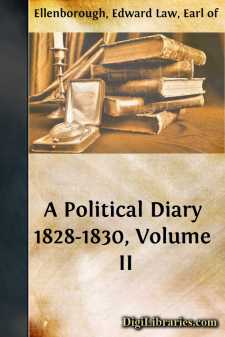Categories
- Antiques & Collectibles 13
- Architecture 36
- Art 48
- Bibles 22
- Biography & Autobiography 813
- Body, Mind & Spirit 142
- Business & Economics 28
- Children's Books 16
- Children's Fiction 13
- Computers 4
- Cooking 94
- Crafts & Hobbies 4
- Drama 346
- Education 46
- Family & Relationships 57
- Fiction 11829
- Games 19
- Gardening 17
- Health & Fitness 34
- History 1377
- House & Home 1
- Humor 147
- Juvenile Fiction 1873
- Juvenile Nonfiction 202
- Language Arts & Disciplines 88
- Law 16
- Literary Collections 686
- Literary Criticism 179
- Mathematics 13
- Medical 41
- Music 40
- Nature 179
- Non-Classifiable 1768
- Performing Arts 7
- Periodicals 1453
- Philosophy 64
- Photography 2
- Poetry 896
- Political Science 203
- Psychology 42
- Reference 154
- Religion 513
- Science 126
- Self-Help 84
- Social Science 81
- Sports & Recreation 34
- Study Aids 3
- Technology & Engineering 59
- Transportation 23
- Travel 463
- True Crime 29
A Political Diary 1828-1830, Volume II
Description:
Excerpt
DIARY
April 1, 1829.
The Duke of Wellington wrote to the King to ask if he had any objection to raising the galleries. He had none. So we sent for Sir T. Tyrwhit, and had him at the Cabinet dinner to ask him whether he could fix the galleries by four to-morrow. He said No. So we must do as we can.
Forty foreigners applied for seats to-day after four o'clock.
In the House I made the second reading of the Bills an order of the day at the desire of Lord Malmesbury and Lord Grey. It is more formal so, but the second reading might have been equally well moved without it.
Lord Grey said a few words on presenting a petition expressing a hope to be convinced on the subject of the Franchise Bill, but laying ground for voting against it. Lord Malmesbury likewise expressed himself against it. We shall be hard pushed on this Bill. The Duke says we have 122 sure votes and no more upon it.
The Bishop of Chester read prayers, his wife having died about ten days ago. Really some one of the other Bishops might have relieved him.
Lord Shaftesbury, in the absence of the Chancellor, sat as Speaker. I moved the bills pro formâ for him.
At the Cabinet dinner at Peel's, Peel said the Bishop of Oxford was ready to speak at any time, and wished to follow a violent bishop. He may easily find one.
We had much talk about our approaching debates. Peel, after the Duke was gone, regretted his having taken the line of expressing his anxiety to relieve himself from the obloquy cast upon him, and his having put that desire forward as his reason for pressing the second reading of the Bill on Thursday. The Duke having said so, we could not back him out. We might avoid taking the same ground, but we could not alter it.
Aberdeen mentioned the case of the Candian blockade. I am sorry to see he does not communicate beforehand now with the Duke. He never looks forward to the ultimate consequences of his measures. Now he talks of convoying English ships to Candia, and telling them they may go there safely, and if stopped shall be indemnified. But if the English ship finds a Russian off Candia, and is warned off, yet persists, under the expectation of indemnity, we should be obliged to pay the indemnity. The Russians, having given warning, would be justified in taking the vessel.
So if we give convoy, and the convoy ship persists, we should come to blows. All these things should be foreseen. Aberdeen thinks Lièven is ignorant of Heyden's having had any orders. He excuses him as having acted in the spirit of the treaty, to avoid the effusion of blood!
One thing is clear; we cannot permit Russia, as a belligerent, to defeat the objects of the Treaty of London, and yet act with her under that treaty.
April 2.
Second reading Catholic Relief Bill. The Duke made a very bad speech. The Archbishop of Canterbury drivelled. The Primate of Ireland made a strong speech, his manner admirable. Both these against. The Bishop of Oxford had placed himself at our disposal to be used when wanted. We put him into the debate here, wanting him very much....


